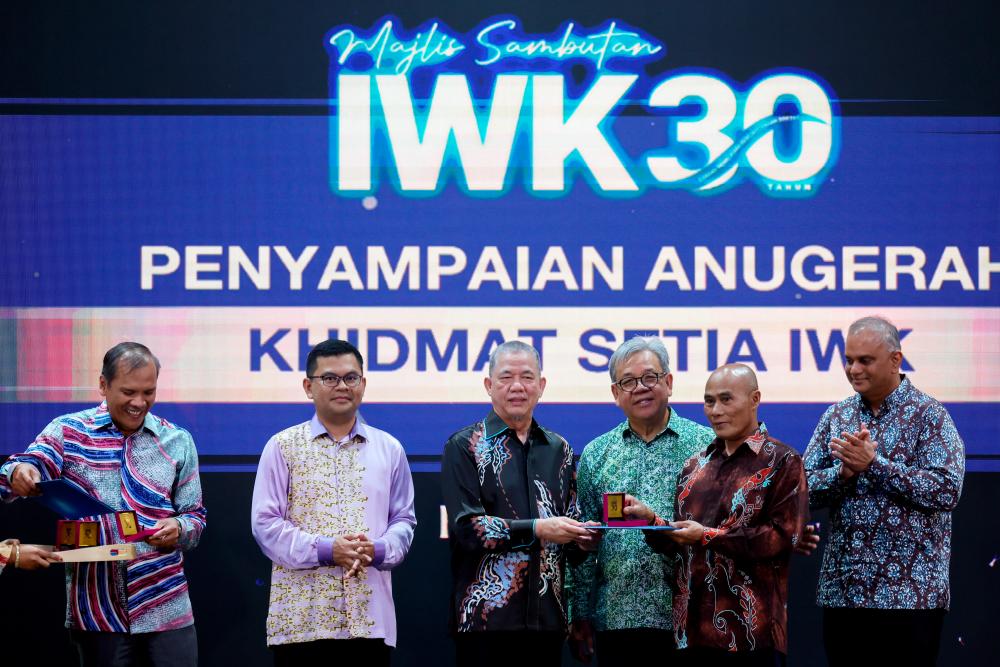KUALA LUMPUR: Indah Water Konsortium (IWK) Sdn Bhd celebrated its 30th anniversary with the theme, “IWK30: Three Decades of Ensuring People’s Well Being”, here yesterday.
Present at the ceremony were Deputy Prime Minister Datuk Seri Fadillah Yusof, Energy Transition and Water Transformation Deputy Minister Akmal Nasrullah Mohd Nasir, and IWK CEO Narendran Maniam, among others.
IWK chairman Ahmad Johnie Zawawi said over the past three decades, the company has remained committed to upholding its duty to preserve the environment and safeguard public health for sustainable development.
“IWK has embarked on a transformation journey towards advancing various green technology initiatives that go beyond managing sewage treatment.
“Since 2012, IWK’s Indah Water Research Centre has been spearheading research and development efforts in wastewater treatment through collaborations with universities and researchers,” he said.
Ahmad Johnie said the projects are aimed at improving efficiencies and seeking beneficial uses for by-products such as effluents, biosolids, and biogas.
He said effluents are produced from the sewage treatment process before being released into rivers and the environment to be used as alternative non-potable water sources, which helps reduce dependence on clean water supply.
“With our strength and credentials, IWK is leading capacity-building projects via mentorship programmes by UN-Habitat and the Asian Development Bank.
“In 2023, IWK achieved environmental compliance standards, with a rate of 98% of effluents discharged,” he said.
Ahmad Johnie said biosolids, on the other hand, are the end products of sewage treatment and rich in nutrients, making them useful as fertilisers for non-food crops.
He said IWK has also initiated a collaboration with Koperasi Kebuniti Selangor Berhad to conduct pre-commercialisation research aimed at transforming biosolids into biofertilisers for non-food plants and landscape vegetation.
This marked the beginning of diverting waste from landfills before 2030.
“Meanwhile, biogas is generated as a renewable energy source from sewage sludge through anaerobic digestion.
“It is then used to generate electricity for operations in six regional sewage treatment plants. With the use of green technology, we are implementing a project to install photovoltaic solar energy systems at nearly 500 existing plant sites,” he said.
Ahmad Johnnie said IWK is also recognised as one of the four leading entities in the Sustainable Development Goal 6 Pledge at the Global Water Summit 2024 in London, UK.
He said the achievement highlights IWK’s commitment to sustainable practices through a comprehensive strategy to expand sewage services.
“All the successes achieved by IWK would not have been possible without the support and cooperation of various parties that have yielded positive results for economic growth, environmental conservation, and community welfare.”
Ahmad Johnie said today, IWK proudly stands as a nation’s sewerage company that’s not just recognised in Malaysia but internationally as well.
“While ensuring our core task of providing efficient sewage services, we are also actively pioneering various non-core research and business initiatives that have a positive impact on the environment and society.”
He said IWK will remain steadfast in its commitment to serving Malaysians and aims to protect public health, pioneer innovative and sustainable practices and lead environment conservation efforts for the country’s overall well-being.









